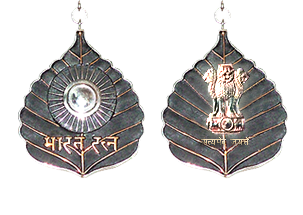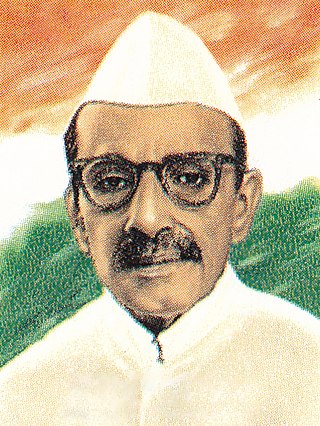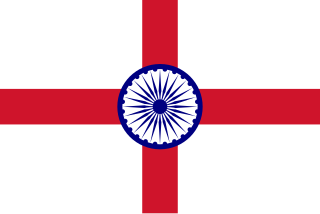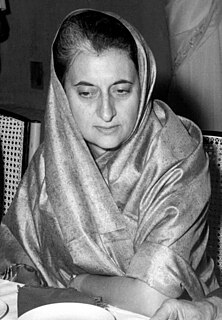
The prime minister of India is the head of government of the Republic of India. Executive authority is vested in the prime minister and their chosen Council of Ministers, despite the president of India being the nominal head of the executive. The prime minister is often the leader of the party or the coalition with a majority in the lower house of the Parliament of India, the Lok Sabha, which is the main legislative body in the Republic of India. The prime minister and their cabinet are at all times responsible to the Lok Sabha.

The Indian National Congress (INC), colloquially the Congress Party but often simply the Congress, is a political party in India with widespread roots. Founded in 1885, it was the first modern nationalist movement to emerge in the British Empire in Asia and Africa. From the late 19th century, and especially after 1920, under the leadership of Mahatma Gandhi, the Congress became the principal leader of the Indian independence movement. The Congress led India to independence from the United Kingdom, and significantly influenced other anti-colonial nationalist movements in the British Empire.

The Bharat Ratna is the highest civilian award of the Republic of India. Instituted on 2 January 1954, the award is conferred in recognition of "exceptional service/performance of the highest order", without distinction of race, occupation, position, or sex. The award was originally limited to achievements in the arts, literature, science, and public services, but the government expanded the criteria to include "any field of human endeavour" in December 2011. The recommendations for the Bharat Ratna are made by the Prime Minister to the President, with a maximum of three nominees being awarded per year. The recipients receive a Sanad (certificate) signed by the President and a peepal leaf-shaped medallion. There is no monetary grant associated with the award. Bharat Ratna recipients rank seventh in the Indian order of precedence.

The Parliament of India is the supreme legislative body of the Republic of India. It is a bicameral legislature composed of the president of India and two houses: the Rajya Sabha and the Lok Sabha. The president in his role as head of the legislature has full powers to summon and prorogue either house of Parliament or to dissolve the Lok Sabha. The president can exercise these powers only upon the advice of the prime minister and his Union Council of Ministers.

Gulzarilal Nanda was an Indian politician and economist who specialized in labour issues. He was the Interim Prime Minister of India for two 13-day tenures following the deaths of Jawaharlal Nehru in 1964 and Lal Bahadur Shastri in 1966 respectively. Both his terms ended after the ruling Indian National Congress's parliamentary party elected a new prime minister. He was awarded the Bharat Ratna, India's highest civilian award, in 1997.

Vijaya Lakshmi Pandit was an Indian diplomat and politician who was the 6th Governor of Maharashtra from 1962 to 1964 and 8th President of the United Nations General Assembly from 1953 to 1954, the first woman appointed to either post. Hailing from a prominent political family, her brother Jawaharlal Nehru was the first Prime Minister of independent India, her niece Indira Gandhi the first female Prime Minister of India and her grand-nephew Rajiv Gandhi was the sixth Prime Minister of India. Pandit was sent to London as India's most important diplomat after serving as india's envoy to the Soviet Union, the United States and the United Nations. Her time in London offers insights into the wider context of changes in Indo–British relations. Her High-Commissionership was a microcosm of inter-governmental relations.

The Chief of the Naval Staff (India), also known as the Navy Chief, abbreviated to CNS, is a statutory position in the Indian Navy held by a four star admiral. As the highest ranking officer to serve solely in the Indian Navy, the chief is the professional head of the naval branch and the principal naval adviser to the Minister of Defence. The CNS, in a separate capacity, is also a member of the National Security Council and thereby an advisor to the president and the prime minister. The CNS is typically the most senior naval officer in the Indian Armed Forces, unless the Chairman Chiefs of Staff Committee is a naval officer.
Nuclear power is the fifth-largest source of electricity in India after coal, gas, hydroelectricity and wind power. As of November 2020, India has 22 nuclear reactors in operation in 8 nuclear power plants, with a total installed capacity of 7,380 MW. Nuclear power produced a total of 43 TWh in 2020-21, contributing 3.11% of total power generation in India. 10 more reactors are under construction with a combined generation capacity of 8,000 MW.
Brijlal Verma was a cabinet minister in Morarji Desai ministry in India. He held communication portfolio from 1977 to 1979. He was elected to Lok Sabha from Mahasamund on a Janata Party ticket.

Ozhalur Viswanatha Mudaliar Alagesan was an Indian politician and freedom fighter from the Indian state of Tamil Nadu. He served as a Member of parliament, Lok Sabha from 1952 to 1957, 1962 to 1967 and from 1971 to 1980.

Nityanand Kanungo was one of India's prominent politicians from the state of Odisha, who held successive high-profile portfolios in Prime Minister Jawaharlal Nehru's cabinet.

Lal Bahadur Shastri was sworn in as Prime Minister of India on 9 June 1964. In his ministry, the ministers were as follows.

Indira Gandhi was sworn in as Prime Minister of India for the first time on 24 January 1966. In her ministry, the ministers were as follows:

Charan Singh was sworn in as Prime Minister on 28 July 1979, with outside support by India Congress and Yashwantrao Chavan of Congress (Socialist) faction as his Deputy PM. Just before Singh was to prove his majority in Lok Sabha, Indira Gandhi withdrew support to his government, and he resigned on 20 August 1979, after just 23 days, the only PM who has failed to face parliament. He advised President Neelam Sanjiva Reddy to dissolve Lok Sabha. Janata Party leader Jagjivan Ram challenged the advice and sought time to cobble support. But Lok Sabha was dissolved, and Charan Singh continued as caretaker PM until January 1980.
Anant Prasad Sharma was an Indian Railway Union leader, politician who became Minister of State for Industry, and Union Minister of the government of India. He was also the Governor of the State of Punjab and the State of West Bengal. He was a member of the 3rd Lok Sabha and 5th Lok Sabha from Buxar. He also remained member of the Rajya Sabha thrice, 1968-1971, 1978-1983 and 1984-1988.

The Third Nehru ministry was formed on 17 April 1957 after the Indian National Congress won the 1957 general election with a vast majority.

The Fourth Nehru ministry was formed on 2 April 1962 after the Indian National Congress won the 1962 general election.
Jawaharlal Nehru died in the afternoon of 27 May 1964, at the age of 74, of a heart attack.











